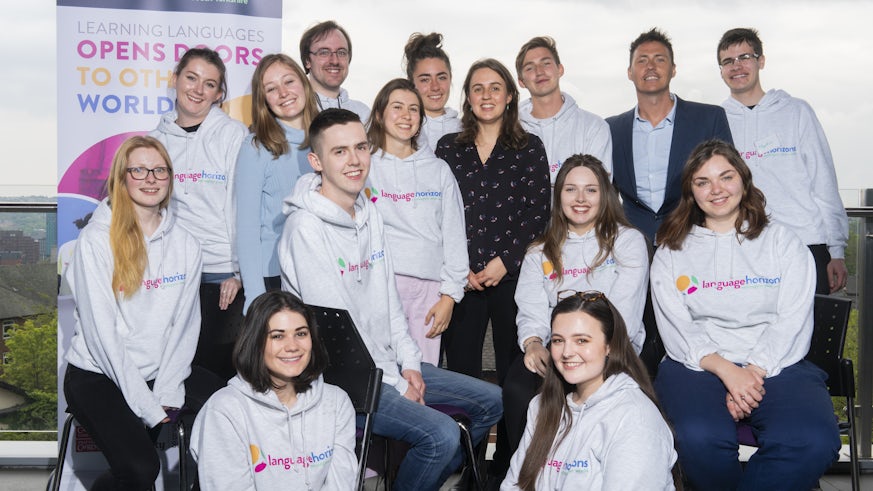Language mentoring project goes from strength-to-strength
3 March 2020

A mentoring initiative designed to increase the number of pupils studying languages at GCSE is being expanded following a successful pilot in England.
The Language Horizons Mentoring Scheme, which is led by Cardiff University’s School of Modern Languages, has won a £430,000 grant from the Department of Education, with a possibility of a £1.5 million extension subject to approval from ministers after seeing the results from the first phase.
Degree students from language courses and others at partner universities have been trained to deliver face-to-face and digital sessions to year eight and year nine pupils, with the aim of helping them explore the opportunities that learning a language can bring. Digital engagement is taking place through a new online platform, which has been developed by South Wales-based agency Tinint.
During its recent pilot in South Yorkshire involving 10 schools, 53% of pupils who took part in the scheme went on to choose a modern foreign language at GCSE. The majority of students who took part rated the course highly and felt it had changed the way they think about languages in relation to their future lives.
A similar scheme was started in 2015 in Wales, funded by the Welsh Government. Partner schools there have reported a doubling in the number of pupils choosing languages at GCSE.
Academic lead Professor Claire Gorrara said: “We are excited about delivering the next phase of our highly successful mentoring scheme. Our pilot in England, as well as the work we have done in Wales, has shown that this approach can make a positive impact on young people’s attitudes to multilingualism.

Learning a language increases confidence, expands knowledge of different cultures and gives young people a broader outlook on what personal and professional choices are available to them. At a time when the uptake of language qualifications is worryingly low, it is vital that universities and schools work together to reverse this trend.
During phase one of the project, which begins this month, student mentors from the University of Sheffield and Sheffield Hallam University are working with schools from South Yorkshire, while student mentors from the University of Warwick and Coventry University are working with schools in the West Midlands. During this period, the project will engage approximately 40 schools, 80 mentors and 1,000 pupils in these regions.
Subject to approval of the second phase from the Department for Education, the two hub model in the West Midlands and South Yorkshire will be expanded further. The next phase will aim to engage approximately 130 schools, 250 mentors and 6,000 pupils. The project will work with the British Council during this period of expansion.
School Standards Minister Nick Gibb said: “Studying a foreign language helps to broaden the horizons and ambitions of young people. This project, which inspires young people to think differently about the value of languages, has exciting potential to enthuse and motivate pupils.
“We’ve taken steps to halt the decline in language uptake since languages became optional at GCSE in 2004. The proportion of children taking a language at GCSE increased from 40% in 2010 to 46% in 2018 – and we are determined to see this rise further.
The languages mentoring programme piloted by Cardiff University is an exciting approach to inspiring young people to consider taking a language at GCSE and changing attitudes towards the value of languages both among pupils and schools.
Mentor at the University of Sheffield, Maddy Blatherwick-Plumb, who was involved in the pilot study, said: “Not only did mentoring for Language Horizons enable me to challenge young people’s perceptions about the value of languages, it also challenged my own perceptions and stretched my personal abilities by putting me outside of my comfort zone in an entirely new scenario. Most importantly, taking part in the scheme has re-enthused my passion for languages and reminded me that it is so much more than vocabulary and grammar – it’s a portal into another culture and another identity.”
Neve Coward, also a mentor from the University of Sheffield, said: “My favourite comment from one pupil was, ‘with languages you could change the world if you tried’.”




